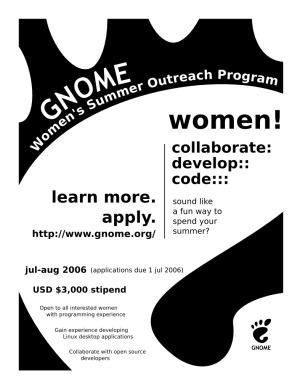Yesterday I came back from aLANtejo, one of the main technology related conferences in Portugal, organized yearly by the Núcleo de Estudantes de Engenharia em Informática (Computer Science Students Association) of University of Évora.
I was there representing the Gnome project (my travel expenses where partially funded by the Gnome Foundation), in order to participate in a round table with the a priori polemic title “Gnome vs. KDE”.
Finally, I was also invited by the organization to give a 90 minutes talk introducing the Gnome project, including some technical tutorial, due to the massive presence of Computer Science students and in general people with computer science background among the public. So I presented the project history, goals, and its underlying technologies (30 minutes); I gave a short tutorial of Glade/GTK/C and Gnome programming (40 minutes); and finally talked a bit about Love and how to collaborate becoming a member of the Gnome project (20 minutes). It was a great experience, with a lot of people in the audience, and I had afterwards a lot of feedback from all kind of people interested in the project, from students to members of some local and international companies that were also attending and wanted to know more about collaboration opportunities.
After my talk, we started the round table. From the KDE side the person representing the project was Joseff Spilner, from Germany. The round table was moderated by a teacher from the University of Évora, that was giving turns to both of us and asking some generic but very interesting questions about similarities and differences among the projects approaches to develop a free(dom) desktop. I had prepared some slides the day before trying to be a bit polemic (in a constructive way), and they were used by all of us in order to improvise a script for the discussion. There were also a lot of questions and comments from the public, some of them more critical with KDE and others with Gnome. I tried to summarize what I think are the main advantages of Gnome: big industry support (we talked quite a lot here about licensing, a quite big difference also that has to be taken into account), very clean user interface, releases every 6 months, ambitious subprojects and platforms/technologies (Mono was a very interesting topic, as always, and quite polemic indeed), integration of other big actors like OO.org or Mozilla, and so on.
It was always nice to attend to the rest of the talks. In general the level of the conference was very good, and I had the opportunity to met for the first time some very interesting people, like Joseff Spilner itself, or Alex Beregszaszi, maintainer of the mplayer project, or Xavier de Blas, who closed the aLANtejo with his very funny but also educative Linux Show.
As a curiosity, I talked all the time in Galician Portuguese, and everything went very softly. It was my first experience in a Portuguese speaking conference, so I asked in the beginning of my talk if everyone was understanding me correctly, and the unanimous answer from the audience was saying that without any problem. In this corner of the world where I happen live there are a lot of linguistic conflicts and polemics, some of them discussing if we speak Portuguese or something “similar but different”, but that is itself subject for a big blog entry, and I will leave this for other day. The fact is that I could communicate without any problem in Évora in my mother tongue, and that is something always great 🙂
Finally, I would like to thank Bruno Teixeira (who contacted me and organized all my travel and stay) and all the organization of the conference for the great work they have done. See you next year!
